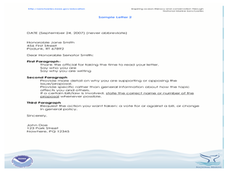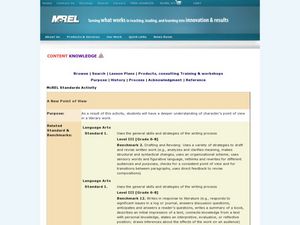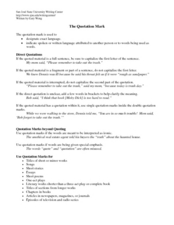Curated OER
Singular and Plural Nouns
Young writers pen the plural version of 40 nouns on blank lines next to the singular version in a straightforward activity. The type and blank lines are small, so I'd enlarge it to make it more friendly to children's small hands. You...
Curated OER
Countables and Uncountables Exercise 1
Young writers determine whether the 19 nouns in the box are accountable or uncountable. They place each noun in the Venn Diagram and then fill in each blank in 9 sentences with the words a, an, any and/or some. A good worksheet!
Curated OER
Telling Your Story
Have young writers compose stories that add detail to the moments captured in personal photographs and create an annotated photo album. Rather than sending every member of the class home for the weekend with a digital camera, you might...
Curated OER
"I Believe..." Podcast Style
Use this communication skills lesson to emphasize evaluating a speaker's main point and argument. After reading Martin Luther King's, "I Have a Dream Speech" and John F. Kennedy's speech, "I Believe in an America Where the Separation of...
Curated OER
In My Opinion
Young writers craft letters to the government stating their opinion on different topics. They pick an environmental or ocean issue, research it, and craft their formal persuasive letter. Ensure your learners include supporting facts and...
Curated OER
Complex Sentences Made Easy
Take the complexity out of writing complex sentences. Young writers practice taking two ideas and putting them together to make a complex sentence. Create a list of subordinating conjunctions to help each individual make better sentences.
Curated OER
Figurative Language: Part Two
Help your young writers make their writing more descriptive and exciting in this figurative language lesson. Middle schoolers review their figurative language examples from Part One (linked to this lesson), and then write a paragraph for...
Curated OER
A New Point of View
Analyze point of view and how it affects a literary work with this lesson. Middle schoolers create a written piece that focuses on point of view. They review the literary term "point of view," and explore examples of the term in text....
Curated OER
Writing Formal Letters
Help your young writers recognize the importance of composing formal letters. Middle schoolers read letters written by Thomas Jefferson and analyze the components that make it a formal letter. They will then compose their own...
Curated OER
Aztec Myths: Writing Editorials
Middle schoolers write an editorial giving an opinion of whether or not Quetzalcoatl has arrived and if so, what the Aztecs should do. They discuss whether or not they believe Quetzalcoatl is a god or a man, and use an Editorial...
Curated OER
Plagiarism
Don't get caught plagiarizing! Before starting your research unit, use this lesson plan to help your young writers identify plagiarism. The truth is, many kids don't even realize when they're doing it! They practice citing sources when...
Curated OER
Sequencing
Are you looking for a way to teach sequence of events in your narrative writing unit? Bring this lesson to your middle school class, as it prompts young writers to create a narrative sequence map of events that have happened at school...
Curated OER
Writing Lesson Plan: Stop and Go: Capitals and Periods
Examine writing using a fun, interactive format. Young writers choose a piece of their own writing to proofread for initial capitals and final periods they left out. They work independently using green stickers to add capitals and red...
Curated OER
Improving Descriptive Writing: Painting an Original Picture
Descriptive writing is rich in sensory appeals and paints pictures in the minds of readers. Show young writers how to use an on-line thesaurus and a cliché website to create fresh, descriptive writing. The presentation ends with an...
Curated OER
How To Do an AHAP DBQ
How is an essay like a hamburger? Detailing the "meaty" parts of a well-written essay, this presentation takes students through the process of using a strong thesis statement to write a thorough and engaging response to a Document Based...
Curated OER
Poetry Beyond Words
Participate in writing poetry as a group. Focused on a given theme, young writers compose a popcorn poem using sensing verbs and adverbs. They write popcorn poems, onomatopoeias, collective poems, and diamond poems. You could introduce...
Curated OER
Thumbs Up For Movie Reviews
If your class loves movies, this lesson is sure to interest them. After discussing the purpose and structure of movie reviews, young writers compose a movie review and discuss why people may read a review before they go see a film. The...
Curated OER
Using Commas Correctly
Commas can be complicated. Help learners achieve a greater understanding of comma usage with this handout, which includes two different comma activities. Following given directions, young writers punctuate provided sentences and combine...
Curated OER
Unlocking the Secrets of a Persuasive Essay
Full of tips about structure, audience, and evidence in a persuasive essay, this presentation would be a great way to start a writing unit in your class. One slide advises young writers to make up quotes and statistics in their essays....
San José State University
The Quotation Mark
Review where quotation marks belong and what they are used to indicate. From direct speech to in-text citations, young writers will find this worksheet quite useful. Several exercises at the bottom, along with a key, give learners...
Curated OER
Adding -ing to Words
If you are teaching your young writers about the rules involved when adding -ing to the end of a word, then this presentation is for you! Learners are shown the two most important rules when adding -ing to the end of a word, then...
Curated OER
What's wrong with "could of," "should of," "would of?"
A common mistake in writing is using the words, "could of" instead of "could have." Additionally, many young writers make the mistake of following a contraction with the word "of." For example; He wouldn't of waited for you. This...
Curated OER
Creating Complex Sentences
Here is an excellent presentation on creating complex sentences. Young writers discover that a complex sentence is a sentence that joins two or more sentences together. There are many ways for these types of sentences to be constructed,...
Curated OER
The Setting
One of the most important elements of a story is the setting; when and where the story takes place. This presentation gives young writers excellent tips on how to create a setting by using visuals, time, description, and interesting...

























